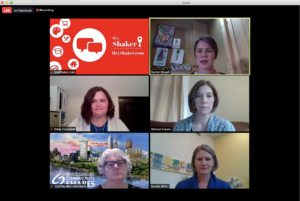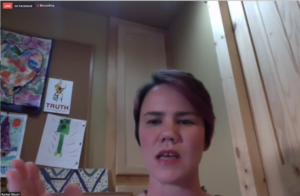Summary of Video forum from May 21, 2020 by Briana Oldham
The pdf is here

 Rachell Dissell, moderator, Emily Campbell, Assoc Director, Center of Community Solutions, Melissa Graves, CEO, Domestic Violence & Child Advocacy Center, Cynthia J. Ries, Exec Director, Greater Cleveland Community Shares, Sondra Miller, President & CEO, Cleveland Rape Crisis Center
Rachell Dissell, moderator, Emily Campbell, Assoc Director, Center of Community Solutions, Melissa Graves, CEO, Domestic Violence & Child Advocacy Center, Cynthia J. Ries, Exec Director, Greater Cleveland Community Shares, Sondra Miller, President & CEO, Cleveland Rape Crisis Center
How Cleveland nonprofits plan to survive COVID-19
by Briana Oldham
COVID-19 has changed everything. Creating a new landscape for the future comes with adjusting to the times.
In a forum held Thursday night, a panel of representatives from several nonprofits in the city of Cleveland came together to discuss the impact of COVID-19 and how to adapt to the new normal.
The hour-long discussion, presented by the Shaker Heights Chapter of the League of Women Voters Greater Cleveland opened with remarks from former Plain Dealer reporter, Rachel Dissell.
How can nonprofits continue to deliver services to Cleveland residents during a global pandemic?
Panelists Emily Campbell, Associate Director from the Center for Community Solutions, Melissa Graves, CEO of the Domestic Violence & Child Advocacy Center, Sondra Miller, President & CEO of the Cleveland Rape Crisis Center, and Cynthia J. Ries, Executive Director of the Greater Cleveland Community Shares took to Zoom to answer this and so much more.
Graves, who has spent her career working with vulnerable families, noted that decisions on how to provide services during this time were made immediately. Due to all the uncertainty right now, which abusers don’t like, the center felt it best to keep critical services open.
“We knew it was going to be a very volatile and dangerous situation [having abusers at home around the clock] so we pivoted very quickly,” Graves said.
What Graves and the staff found when trying to provide remote services was that it forced the center to go in a direction that they had already been moving toward but had yet to complete. The staff has been able to attend virtual trainings and webinars to provide advocacy services to work with clients remotely.
“There is a curiosity around what’s been happening with domestic violence and child abuse,” Graves said.
With that idea in mind, the mission is now more important than ever, and their efforts have been well received. Since people still need housing, the center has also worked diligently to expedite permanent housing in order to provide some level of social distancing.
Pivoting was a resounding theme during the forum, as several agencies had to move to immediately decide how to proceed and without a lot of information at the time.
The Center for Community Solutions conducted a survey about problems agencies were facing and how they were dealing with them. Campbell wanted to look at data to get a sense of if the reports they received were across the board or just in some area pockets.
There were 734 groups across the state of Ohio over the span of two weeks in late April who participated in the survey. Though all 88 counties were represented, the core of the responses came from Cuyahoga County where community solutions has the deepest reach.
The biggest question was what the level of disruption was on the various agencies due to COVID-19 and/or the Stay at Home Order.
“We thought it was important to ask about those two things together because what we’re seeing is that it’s not just about the virus, it’s the response to the virus as well,” Campbell said.
What they found was the vast majority of service providers reported their services had been disrupted. Though 38% indicated that there was some disruption, but it was manageable, 20% listed significant disruption and they expect the return to services to be difficult.
“We are most concerned with the 20% because these are the groups that have faced some real challenges over the course of the last two months,” Campbell said.
A big takeaway was that over 75% reported shifting to providing services over the phone or via video chat as a way to adjust. The responses came from agencies ranging from a staff size of five people to those with over 500 employees.
There are pivots that pertaining to certain agencies had to make that most others might not have had to consider. This holds true for the Cleveland Rape Crisis Center due to the inability to have in person visits and provide emergency room support.
Miller described coming up with goals at the beginning of the year to transition to providing services via telehealth but didn’t think they would be implemented so quickly. Telehealth is the ability to provide health services and support electronically using various means of technology.
“Staffing clients who started out being a little bit resistant to it, came to really enjoy it and feel like that it was an even better experience,” Miller said.
Some chose not to participate, as this method of receiving advocacy is not for everyone. The center also had to navigate the hospital emergency rooms since there were a lot of mixed reactions to new protocols in place.
Miller believes there is an opportunity for telehealth services to continue, especially in parts of the state where they do not have 24-hour sexual assault nursing units.
“I see telehealth being woven into what the future could look like there,” Miller said.
Financial challenges agencies are facing have also become a huge topic of discussion when it comes to nonprofits. Ries began to hear from agencies the Greater Cleveland Community Shares partners with and serves almost immediately at the peak of the pandemic.
Ries mentioned getting a lot of calls and a lot of questions. This is in large part due to most of the members being performing arts groups. Ries notes there being a lot of anxiety about canceled events and what that means for funders.
Though many organizations received loans, the help provided only temporary relief and what the future looks like would still need to be addressed.
“I think what we’re going to see in the next couple months and next year is that fundraising is definitely going to be different,” Ries said.
Ries thinks Cleveland is a generous community and will rally together. She mentions that several foundations have already stepped up and that it has been impressive to watch.
The arts groups have gotten creative when coming up with ways to serve young people and keep them connected and engaged.
“Our arts groups, our members have really stepped up, and have been doing great community based, family based, meaningful work,” Ries said.
The concept of community shares is the idea of being able to help each other. People still have the desire to do this even during such an unprecedented time and it is clear the support is a mighty force.
##
How will some of Cleveland’s most critical non profits survive Covid-19?
A video forum on May 21, 2020
with Rachel Dissell, former Plain Dealer Reporter and panelists:
•Emily Campbell, Assoc Director, Center of Community Solutions
•Melissa Graves, CEO, Domestic Violence & Child Advocacy Center
•Sondra Miller, President & CEO, Cleveland Rape Crisis Center
•Cynthia J. Ries, Exec Director, Greater Cleveland Community Shares
